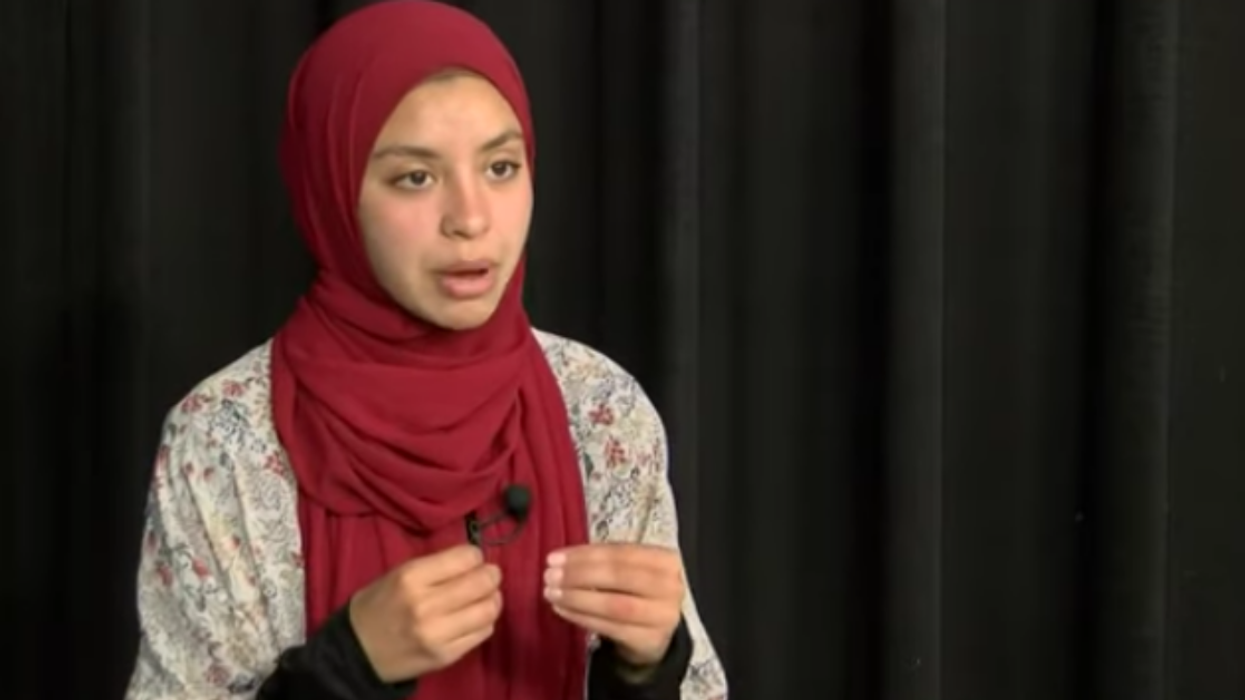This week in Sylvania, Ohio a high school junior was disqualified from running her cross-country race because of wearing a hijab.
After running her strongest 5K at 22 minutes and 22 seconds, Noor Alexandria Abukaram discovered her personal best time would not count or be put to paper.
After crossing the finish line, Abukaram went to the scoreboard to see how she had placed. It was then that she was notified that she had been disqualified for running out-of-uniform and that her performance would not count in the day's race.
Until Saturday's meet, the Sylvania Northview High School cross-country team had run without any problems, including Abukaram.
Race officials told Abukaram that she would need a waiver to wear her hijab while competing if she wanted to run in the next race.
What is confusing is that this was never an issue at any prior race, and she was wearing the same outfit that had never caused issues before. She wore Nike leggings, an Under Armour long-sleeve shirt until her school's jersey, and a Nike-brand hijab, to comply with her religious beliefs and to match the rest of her uniform.
Abukaram reflected:
"At first it was just so humiliating and then was a huge disbelief. This has never happened to me."
A representative of OHSAA, the Ohio State Athletic Association, stated that students can participate in meets while wearing religious head-coverings, so long as they acquire a waiver permitting them to wear the headgear prior to the time of the meet.
The representative said the reasoning for this is that the head-covering is a change to the sport's uniform and needs to be addressed prior to the student competing in order to be within regulations.
The representative added:
"[The officials were] simply enforcing this rule since a waiver had not been submitted. [The organization is now] looking at this specific uniform regulation to potentially modify it in the future, so that religious head-wear does not require a waiver."
What remains confusing about the situation, however, is not only has Abukaram run without a waiver before, but the race officials also had an opportunity to address her uniform prior to the race.
The race officials conducted their usual uniform and safety checks before the competitors lined up to run, and an official even approached one of Abukaram's teammates, stating that her shorts did not meet regulations.
Abukaram confirmed that her teammate quickly changed into compliant racing shorts and then was able to compete. But she wonders why she was not offered the same opportunity.
Abukaram asked:
"Why wouldn't they tell me about my uniform violation just like they told the girl on my team? Why wouldn't they give me that same respect that they gave her? I felt disrespected. I felt humiliated."
According to the OHSAA cross-country rulebook, head-coverings, such as hats and caps, are not permitted during a race. Hijabs, however, are not included in the description.
Religious head-coverings are not referenced anywhere in the rule book, so decisions surrounded their inclusion and acceptance on the racing platform continue to be made by word-of-mouth, which leads to inconsistencies and confusion from race to race.
Abukaram hopes to see improvement in how this is handled in the future, for herself and other religious runners.
Abukaram said:
"My hijab is a part of me. For them to tell me to race without my hijab, it's them telling me not to race at all. And I'm sure that applies for a lot of other people that feel strongly about their religion."
Onlookers have reached out via Twitter to show their support for the runner.
However the OHSAA chooses to address head-gear in their rule book in the future, it's clear that the rules need to be consistent and clear-cut to avoid confusion for their runners or possible abuses by officials.
It's also important to address whether or not it's ethical for apparel that is a part of a religion to require a waiver in the first place, when the apparel doesn't lead to health or safety concerns.
People fear what they don't understand. Teach your children about cultural and physical differences with Selma's Dolls and the accompanying book about a child's first day of school where she meets a Muslim child, a child with Mexican heritage and a child with Down syndrome. The Ameena doll is available here.









 @lamorne/Instagram
@lamorne/Instagram @bigbeaubrown/Instagram
@bigbeaubrown/Instagram @musiccitykristy/Instagram
@musiccitykristy/Instagram @phil_torres/Instagram
@phil_torres/Instagram @vbarreiro/Instagram
@vbarreiro/Instagram @franklinjleonard/Instagram
@franklinjleonard/Instagram @br1an02/Instagram
@br1an02/Instagram @ohhelloitsmax/Instagram
@ohhelloitsmax/Instagram @frecklesmarie/Instagram
@frecklesmarie/Instagram








 @JaJa_no_NO/X
@JaJa_no_NO/X @CWMorgan1000/X
@CWMorgan1000/X reply to @spain2323/Instagram
reply to @spain2323/Instagram reply to @spain2323/Instagram
reply to @spain2323/Instagram reply to @spain2323/Instagram
reply to @spain2323/Instagram reply to @spain2323/Instagram
reply to @spain2323/Instagram reply to @spain2323/Instagram
reply to @spain2323/Instagram reply to @spain2323/Instagram
reply to @spain2323/Instagram reply to @spain2323/Instagram
reply to @spain2323/Instagram reply to @spain2323/Instagram
reply to @spain2323/Instagram reply to @spain2323/Instagram
reply to @spain2323/Instagram reply to @spain2323/Instagram
reply to @spain2323/Instagram reply to @spain2323/Instagram
reply to @spain2323/Instagram reply to @spain2323/Instagram
reply to @spain2323/Instagram reply to @spain2323/Instagram
reply to @spain2323/Instagram reply to @spain2323/Instagram
reply to @spain2323/Instagram reply to @spain2323/Instagram
reply to @spain2323/Instagram reply to @spain2323/Instagram
reply to @spain2323/Instagram